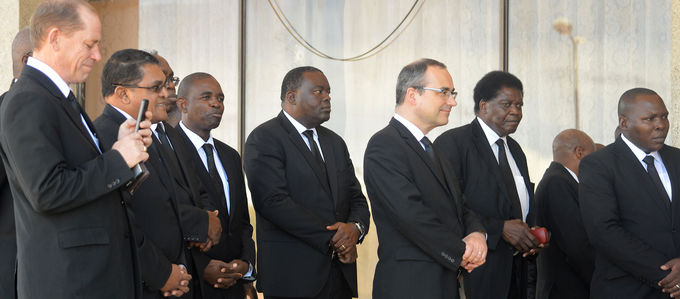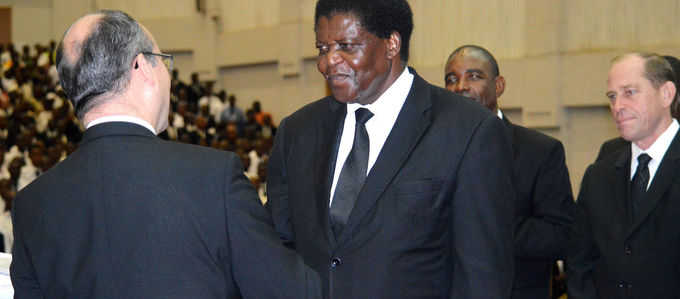
“If you ask anything in My name, I will do it”—these words of Jesus are quite familiar. But what do they mean exactly? What conclusions are we to draw from them? Following are some answers from a divine service by the Chief Apostle.
Around 57,000 members were along for the party on 19 April when Chief Apostle Jean-Luc Schneider visited Dodoma, the capital of Tanzania, to usher in a new generation of leadership, some 6500 of them on location, and over 50.000 others by television broadcast throughout the congregations of Tanzania, Kenya, and Uganda.
In belief in the Son of God
The Chief Apostle noted that the Bible text from John 14: 14 incorporates a wonderful promise. “But just think about all the different wishes people have,” objected the Chief Apostle: “It would be simply wonderful if all we had to do was ask Jesus, and He would fulfil everything we asked!” He went on to point out, however, that Jesus had associated some conditions with this promise.
“First of all, we must believe that He was not just some miracle worker or great prophet, but rather the Son of God, who came to earth in order to bring mankind salvation and eternal life as the Redeemer.” And a second condition: “We must ask in His name, which is to say that we must ask these things of Him as though He would do them for us if He were in our place.”
Examples that that are inconsistent with Jesus
By way of some biblical examples, the Chief Apostle illustrated a series of pleas that were not in the mind of Jesus:
- When the Pharisees asked Him to perform a miracle to prove that He was the Son of God (Matthew 12: 39-40), Jesus refused. “This was a clear response: ‘You must believe in the resurrection. You will not receive any other sign.'”
- “There are many people today who would surely love to ask Jesus, ‘Come on, can’t You change Your gospel? Why don’t You adapt it to our time, to the circumstances that prevail in our country?’—but the gospel of the Son of God is valid for all eternity” (cf. Mark 13: 31).
- “We cannot ask Him to punish sinners.” After all, Jesus prevented the adulteress from being stoned to death (cf. John 8: 4). “Jesus is the Redeemer. His desire is to deliver sinners, not punish them.”
- “Beyond that, it is of no use to ask Jesus to bless a divided or fickle heart” (cf. Matthew 7: 22-23). For example, “we cannot solve a problem by lying to try and get it out of the way. The Lord cannot bless such a thing.”
- And finally, there was also a reference to Mary, who had “chosen that good part” (Luke 10: 39, 42). “We cannot expect Jesus to attach more importance to our earthly life than to our eternal life.”
Examples that are in harmony with Jesus
“So what kinds of things can we ask of Him? That is quite simple,” said the Chief Apostle clearly, “We can ask Him for the same things that He asked of the Father.”
- Jesus prayed that Peter’s faith would not become weak (Luke 22: 32). “If we ask the Lord for a strong faith, He will give it to us, because that is exactly what He is also praying for on your and my behalf.”
- We can pray in accordance with the example of Jesus: “Lord, Your will be done.” This is not always easy, “but it signifies that we have resolved to remain faithful no matter what comes our way. Then Jesus will help us.”
- To ask for something in the name of Jesus also implies that we ask Him for grace. “If we ask for grace in humbleness, repentance, and willingness to forgive, He will grant it unto us. He likewise prays for this on our behalf” (1 John 2: 1).
- “If we pray sincerely for unity within the congregation, Jesus will grant it unto us.” After all, He prays exactly the same for us, namely oneness among those who believe in Him through the Apostles (John 17: 20-21).
- When we ask Him, “Please shorten the time and come soon,” He will fulfil our plea, because He is pleading for the very same thing (Revelation 22: 20).
The Chief Apostle’s conclusion: “If we pray in harmony with these five points, we will always be praying in Jesus’ name. And He will respond to us.”




























